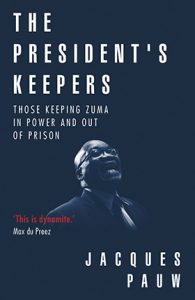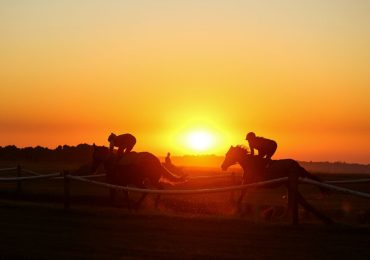Jacques Pauw’s new book The President’s Keepers shows that children will have it harder tomorrow and that the children of South Africa’s poor will have it harder still, writes Imraan Coovadia.
The President’s Keepers
Jacques Pauw
Tafelberg, 2017
 The attempt, some five days after it was published, to remove Jacques Pauw’s book The President’s Keepers from bookshops seems to have backfired on the State Security Agency and the South African Revenue Service, having drawn the attention of the country to the information contained in the text, not to say prompting the circulation of thousands of pirated copies by WhatsApp. The controversy underlines the express point Pauw makes about the abuse of the government bureaucracy to advance the interests of Jacob Zuma.
The attempt, some five days after it was published, to remove Jacques Pauw’s book The President’s Keepers from bookshops seems to have backfired on the State Security Agency and the South African Revenue Service, having drawn the attention of the country to the information contained in the text, not to say prompting the circulation of thousands of pirated copies by WhatsApp. The controversy underlines the express point Pauw makes about the abuse of the government bureaucracy to advance the interests of Jacob Zuma.
The corollary has also been shown. Without a method of enforcement, none of the grievous breaches of the law Pauw details, which include rape and many counts of murder alongside wholesale peculation, will be prosecuted, no matter how well-known they are to the public. Indeed the conmen and smugglers now taking prominent places, as reported the past few days by the press, in the entourage of presidential hopeful Dr Nkosazana Dlamini Zuma—whose CV includes being a cabinet minister in several portfolios, Chairperson of the African Union Commission, and, tellingly to some, former wife of Jacob Zuma—signal a new round of fraud supervised from the top. The revelations in Pauw’s book have already made the rounds, in particular allegations of President Zuma’s refusal to file tax returns; and that he was paid a million rand a month for a shadow job during his first months in office. The 140 dud cheques Zuma supposedly wrote, the shipments of cash from a Russian mining company, and the need constantly to siphon money from benefactors, including Nelson Mandela, round out a portrait, by Pauw, of a dark parasite.
Yet the overall picture painted by The President’s Keepers—whose author has impeccable investigative credentials, having broken, among other stories, the existence of Vlakplaas and the apartheid state’s associated death squads—is much more disturbing than one man’s psychology. In the relentless construction of a gangster state Zuma has intervened consistently to promote people responsible for serious crimes and to remove any person who tried to enforce the law. It was not necessary to aid and abet crime to serve former president Thabo Mbeki, although his police commissioner, Jackie Selebi, found it no impediment to his career, whereas now figures like Lynne Brown (current Minister of Public Enterprises), Brian Molefe (formerly one Brown’s direct reports as CEO of Eskom, South Africa’s main power utility), and Jessie Duarte (current Deputy Secretary-General of the ANC) show that a certain hatred of justice and integrity is necessary to operate inside Zuma’s circle. The occasional comedy they have provided in recent years, from Molefe’s ‘Saxonwold Shebeen’ antics to Brown’s girlfriend’s sudden expertise in the oil industry, is small consolation for the certainty that they have no intention of leaving power in December, when their patron’s term as President of the ANC is set to expire. (He will theoretically remain President of South Africa until 2019.)
The most instructive case studies in The President’s Keepers are the charmed careers of Richard Mdluli, former head of police intelligence, and Tom Moyane, present head of the South African Revenue Service and once the babysitter of Zuma’s children in Mozambique. Moyane has managed in a few short months to destroy the legitimacy of the country’s tax system while Mdluli is suspected of arranging a hit on his former girlfriend’s lover, the unfortunate Oupa Ramogibe. When Ramogibe reported it to the police he was taken back to the scene of the attack and killed there. The dossier went missing, only to be later recovered in a police station commanded by Mdluli. Honest men and women inside the government have not fared well. Anwa Dramat, the former head of the Directorate for Priority Crime Investigation, aka The Hawks, had to be removed from office for the sake of Mdluli. Many of these facts and allegations have been in the public domain for some time, but Pauw shows how the need to protect Mdluli quickly corrupted prosecutors and police like Nomgcobo Jiba and Riah Phiyega, two of Jacob Zuma’s lieutenants in law enforcement.
Like Donald Trump, Zuma’s appetite for truly amoral servants has had unforeseen consequences when their incompetence has ensnared him. In August 2012, of course, Phiyega oversaw the police response at Marikana, resulting in democratic South Africa’s first state-sponsored massacre. One is also tempted to think of senior figures like Deputy President Cyril Ramaphosa, Minister of Health Dr Aaron Motsoaledi, and ANC Treasurer-General Dr Zweli Mkhize, who have not entirely lost their reputations. How have they been comfortable in a government which has made daylight murder a mere professional inconvenience? But it is unfair to single them out. The party chose a man for the Presidency whose supporters had a singular message for the young woman, known as Khwezi, who accused him of rape: ‘Burn the bitch!’ The country ratified this decision at an election. The independent press, in particular the Sunday Times, then edited by Phylicia Oppelt, echoed the fraudulent accusations of the Zuma clique while a large part of the academic left abandoned itself to demagoguery at the sound of mere phrases like ‘white monopoly capital’ and ‘decolonisation’. On the latter point, a critic of South Africa’s current state of affairs might argue that insisting that the law not be enforced on a university campus is a perfect parallel to insisting that the prohibition on rape and murder not be enforced against Zuma or any of his co-conspirators. It is not a coincidence that Zuma’s security officials and his supporters in the media have been on good terms with certain factions of the Fallists.
The saddest story in The President’s Keepers is not that of Cyril Ramaphosa, though, who kept quiet until he realised silence would not bring him the Presidency and now worries that bribes are going to buy the office for Dlamini-Zuma. Nor is it that of Phumzile Dube, killed in a taxi when Zuma’s son, Duduzane—notoriously on the payroll of one of his father’s many benefactors, the Gupta family—lost control of his Porsche, whose death has never been investigated. Nor is it that of Khwezi, who died after years in exile because, in South Africa, we would not let her go free for the crime of having said that she was raped. (See journalist Redi Tlhabi’s new book, Khwezi: The Remarkable story of Fezekile Ntsukela Kuzwayo, which has had a near-rapturous reception in South Africa.) Nor is it that of the hundreds of children who have been killed in recent years by gunfire on the Cape Flats. (Zuma’s cronies dismantled an investigation into the source of those guns, which seem to have originated inside the police. In 2015, Pauw reminds us, the Salt River Morgue, which serves the Flats, recorded an increase in gunshot fatalities from 290 to 695, or around one hundred fifty percent.) The saddest story is that, without a dramatic reversal, the state which is responsible for the welfare of 55 million people will be able to provide almost nothing—little in the way of water, health, education, or a functional economy—for generations to come. Our children will have it harder tomorrow and the children of South Africa’s poor will have it harder still, so hard that it is not safe to dwell on the matter.
The only happy story in The President’s Keepers, meanwhile, is told to Pauw by police Major-General Jeremy Vearey, who ‘accompanied Mandela to the Bahamas in December 1993’. The trip was supposedly for the sake of Mandela’s health but in reality Mandela ‘wanted to attend a festival on the island’. When they arrived:
… they discovered that the theme for the event was Nelson Mandela. Hundreds of people wore Mandela masks, rum flew freely and a whiff of dagga permeated the air. Tata [Mandela] spontaneously joined the party, was swallowed up by the crowd and went missing! Vearey couldn’t spot him among the masses and it took some time to locate a weaving and bobbing Mandela. ‘I’m having a really good time,’ he said.
What can we say for South Africans and our bad times? We’ve let ourselves be brought to misery and ruin by a man who, as Pauw recollects, never received a single visitor on Robben Island.
- Imraan Coovadia is an essayist, academic and novelist, most recently, of Tales of the Metric System.






Superbly written Imraan…..a pleasure to have been a schoolboy with you. I still remember you asking a question to the Head of Incatha, Mangosuthu Buthelezi (school hall) which lasted a good two minutes, back in 1988/1989; whose response was “Eeeirh…..can you please repeat the question?” You never won the majority of Olympiad’s for nothing. I am proud to have you adding your voice to uncovering the terrible and horrific realities us South Africans try to live in. Currently an Expat, but always in support behind S.A.- my country of origin. Thank You, Imraan.
Brilliant Imraan- you have hit it spot on, especially for my 8 year old who feels the effects of very harshness that you allude to when it comes to the children of the South Africa’s poor. Last night, after 2 years of crippling nightmares- he shared with me that his worse fear is becoming poor and unloved, like the many street and homeless children he sees everyday. What frightens him most- is that the adults turn their faces away ! It is indeed “unsafe to dwell on”.
An enormously important review Imraan. It is a book that no South African can afford to ignore. I am glad that the hyenas behind the jackal are being revealed!
Incisive, insightful, invigoratingly honest, influential and innocently ironical!
As a South African, I found this book an embarrassment and a disgrace. Did we, the people of South Africa, have any choice in that we allowed these events to fester and still grow, unchecked. If not us, then could the politicians and those opposed to the president, not have done something in being more forceful to provide us with the truth. This book reveals that the media stories we are fed with has to carefully considered before acceptance, but if all the media is jumping on the same news thread, then how do we differentiate the truth from the lies.
This book is only the tip of the iceberg